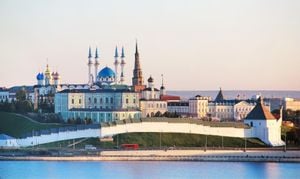The 2025 German Federal Election has delivered its verdict, marking significant changes on the political stage. The Christian Social Union (CSU) emerged as the dominant party with 37.2% of the votes, significantly surpassing the national average for the Union parties at 28.5%. Despite this victory, the CSU found itself grappling with the consequences of new electoral laws which capped the total Bundestag members to 630, resulting in disappointment for several direct candidates.
Markus Söder, leader of the CSU, expressed mixed feelings after the election night festivities, stating, "Unfair and undemocratic" to describe the electoral law which disqualified candidates who had secured direct constituencies. This law particularly impacted those from Southern Germany, where Söder claimed many capable candidates were unfairly sidelined. The CSU leader highlighted how the election results reflect widespread discontent with the current immigration policies attributed to his party's leadership.
Conversely, the Alternative for Germany (AfD) saw its fortunes soar, not just matching but significantly improving on its previous performance. The party doubled its vote share, garnering over 19.5% nationally, with notable successes recorded across various constituencies, including the region of Garmisch-Partenkirchen. Gerrit Huy, the AfD’s candidate, stated confidently, "The citizens have had enough of the failed politics of the old parties and want a real change," encapsulating the mood of many voters who supported their shift toward right-wing politics.
The election outcome also highlighted the prominent dissatisfaction among voters with mainstream parties, with both the Social Democrats (SPD) and the Greens facing declines. Reports indicate the SPD, with only 16% of the votes, experienced significant losses compared to prior elections, prompting discussions about internal reforms and leadership changes.
Within the CSU, the disappointment was palpable, especially for candidates like Volker Ullrich, Claudia Küng, and Sebastian Brehm, who, having successfully won their districts, will not serve due to their absence from the party’s proportional representation. Ullrich expressed his frustration on social media after the results, pointing at the democratic deficits, "I won my district with 31.1% and yet I won't sit. This marks the voters who entrusted me with their choice to feel cheated."
Further complicity could be seen among party leaders grappling with the fallout from these results. Söder admonished the perception of the law as merely the final concession from the current government—"the last unfair greeting from the Ampel coalition to the South." He has vowed to push for changes to the electoral laws to restore faith and representation within the Bundestag.
On the flip side, the elections illustrated a broad base of support for more radical policies among the German electorate. Alexander Dobrindt, another CSU leader, called it "a clear electoral victory for the Union," but at the same time, he acknowledged the mounting pressures for political change driven by civil unrest and dissatisfaction with migration policy.
Despite the triumph for the CSU and the gains for the AfD, the election remains reminiscent of the broader trends of disenchantment swirling through European politics as right-wing parties step forth to fill gaps left by traditional parties. The high voter turnout, peaking at an impressive 96%, indicates not just engagement but also the intense sentiments fostering these surprising results.
Claudia Küng, who fought valiantly for her position, nevertheless observed of her circumstances, "I will continue to fight," showing her determination not to step back amid the changes. She pledged to persist with her advocacy around pressing issues such as healthcare, which she felt were lacking attention during the electoral campaign. This sentiment was echoed by other sidelined candidates who criticized the circumstances as complicated and unjust.
With the dust settling on the election results, the future of German politics looks precarious, especially for traditional parties like the SPD and the FDP, which are now on the brink of reckoning with their stances and policies. The impending coalition talks promise to be intense and reflective of the new political realities revealed by the electorate during this vibrant election.



